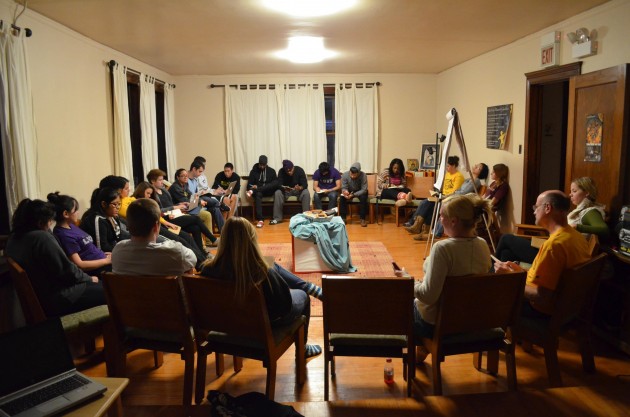
Typically, Bonner Scholars focus on doing service in the Greencastle community and do service, but each year during Winter Term, the freshmen Bonner class steps beyond their boundaries and goes to Chicago for five days to engage in community service outside of the "DePauw Bubble."
The Bonner Scholars Program is a community service-based scholarship where selected students go out into the Greencastle Community to help strengthen the relationship between the campus and the city.
This required Winter Term course and trip has been in existence for five or six years. During the physical class setting, the service trip gives students real-life experience about the issues covered. While in Chicago, the students and staff reside at the Darst Center, which is a faith-based program that works with nonprofits in the city that deal with homelessness and poverty.
The goals for Bonner Scholars during this trip is to gain experience and newfound feelings about what it means to serve people who are less fortunate than them. Some of those feelings are felt prior to the program, whereas others can only be formed through the experiences of the course.
After the first night at the Darst Center, the students get up early to help prepare breakfast, putting themselves in the spirit of service towards those that are closest, first. If they can do service amongst themselves, then service in a community would flow even better. Some examples of their community engagement involve going to the homeless shelters to play games, serve dinner, and bond with the residents a little. Because some shelters are only one gender, the group might split up to go see the women as well.
"The whole point of our visit to the Darst Center was to help the homeless by attempting to see what they experienced," said Fabian Herrera, freshman Bonner Scholar. "The biggest change in my perception of service was that service is great when it's direct, but you also need to look at the long term result and look for a way to end whatever injustices you are directly helping."
Back at the Darst Center after a tedious day of walking around the city of Chicago -minus the train rides - the students come back to talk about different topics that include social justice, civic education and community involvement.
"The Bonner Scholar's program has emphasized the importance of sustainable commitment when servicing the community. Through the work that I do, I find it increasingly important that I remain an engaged, active global citizen," said Demar Ayee, a sophomore Bonner Scholar, majoring in romance languages and economics. "I've seen ways that I can connect my studies to the service that I do, and how I connect my education, service and my interests to create a career that is influenced by serving the global community."
When Bonners go out into the community, they sit in with the elderly at Asbury Towers, or help citizens of Greencastle obtain their GEDs. They build long-lasting bonds with the organizations as well as the individual people that they work with. They have started to create their own tradition of service.
"A huge majority of students do service at some point during their time at DePauw," Jessie Scott said. "People are doing it, the university is saying that it's a tradition, but there doesn't seem to be a dialogue about it, and you don't hear faculty talk about it either."
Their spirit of service gives Greencastle residents the sense of being heard and understood. Greencastle Public Schools have tutors and teacher's assistants who have the time to assist students who need the help, and the kids improve because of the younger volunteers.
"I learned that effective community service requires commitment and engagement: I understand that we were only at the Darst Center for four days and that our work was appreciated, but we didn't leave long lasting positive change in the community," said Demar Ayee, a sophomore Bonner Scholar and romance languages/economics major.
The Civic Education course also provides the Scholars with lessons to value and cherish. These lessons stick with the students as they travel back to campus to spread their new sense of community.
"There are different types of homelessness. Being homeless doesn't just mean that you sleep on the streets at night and beg for money," Ayee said. "When we simulate real-life scenarios, for example, US immigration, and we take it for a game, we're not realizing that we're making a statement on our thoughts towards these issues. Would we act the same way if we were faced with these issues in real life?"
